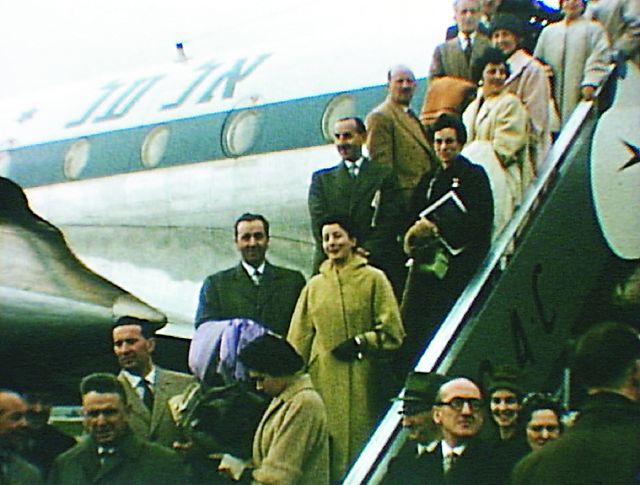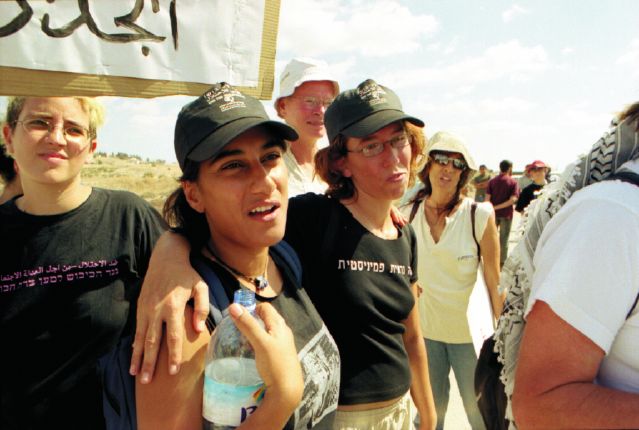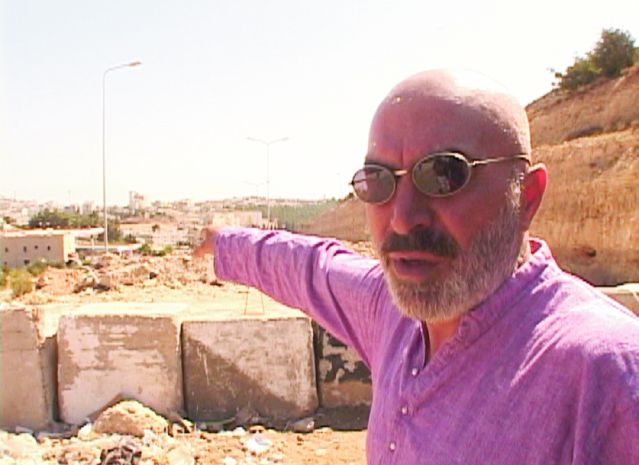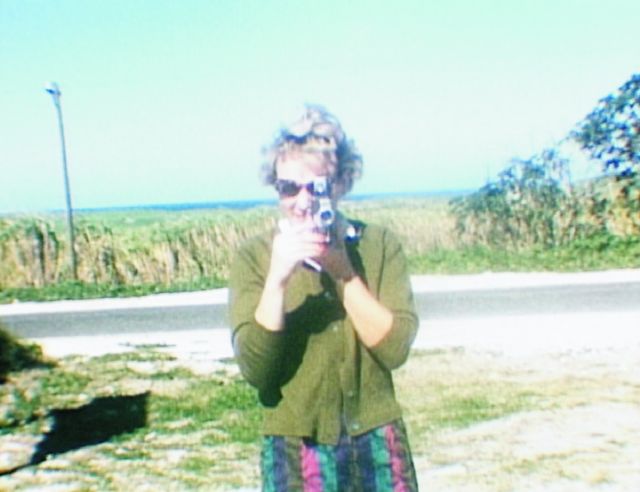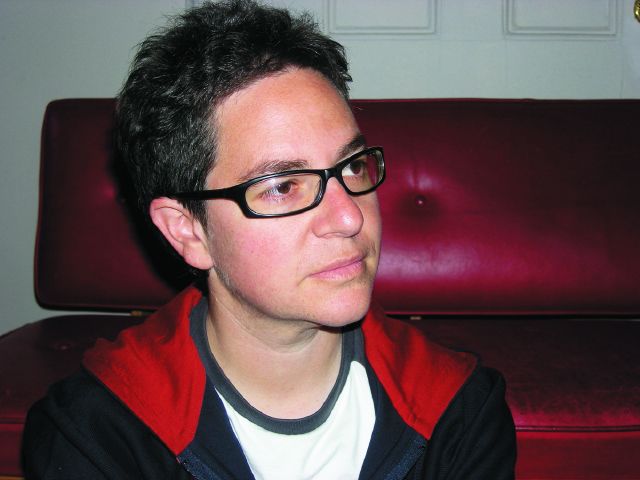Out of sight, out of mind. Physical separation forces those of us without direct links to Israel and Palestine to rely on mediated accounts for information about the troubled region. Filmmaker Elle Flanders knows Israel, as only one who’s lived there can. Her grandparents played a role in the creation of the Jewish state, and with the discovery of images from the past, Flanders documented a story about Israel from inside its borders. Zero Degrees of Separation looks at the situation in Israel from the point of view of two couples—one lesbian, one gay—but sexuality isn’t the focus. Within each couple, one person is Israeli, the other is Palestinian, and both speak out against the treatment of Palestinians by the Israeli government. Flanders spoke to the Alibi about her experience and why she hopes her message can transcend the issue of sexuality to zero in on the problems at the heart of this volatile conflict. What inspired you to make this film? It was really a question of circumstance. I received archival footage from my aunt, who had found it in my grandparent’s basement in Jerusalem. I wanted to do something with the footage and around the same time I got an e-mail from a friend with the story of Salim and Ezra from Salon.com. I felt that somebody should make a film about it, but in the meantime, I didn’t think that I wanted to at all. I tracked Ezra down in Israel and called him. I told him who I was, and he said, “Flanders? Don’t I know you from somewhere?” and I said, “I don’t think so.” He said, “Aren’t you the granddaughter of Chaim and Doris Morrison?” and I couldn’t figure out how he made all the connections. Then he said, “Didn’t you live here in the ’70s?” At this point I was wondering if I was talking to the Israeli Secret Service. Then he said, “I remember you when you were a little girl. I used to work for your grandmother. I was the gardener and you lived at your grandparents house when you moved to Israel.” I thought between that and the archival footage the film chose me. What was your experience while you lived in Israel? The most important thing was that I had a very particular Zionist upbringing and education. I was about 18 or so when I went to university and I heard an alternative story. It was the first time I heard the narrative from the Palestinian and left-Israeli side. Up until that point, everything that was in the education system reinforced one particular way of thinking. The common narrative was that there was no one here before we came, we built this land. It was just a desert, we made the desert green and we did all these fantastic things. I hadn’t learned anything about the displacement of Palestinians. I didn’t know anything about the Palestinian villages that were destroyed, about the Palestinians who were chased out, fled or were exiled, were stuck on boats and sent up to Lebanon or forced into Jordan. I just didn’t know any of it. It was a really big fundamental shift for me to learn another story. What kind of reactions have you had at the film screenings? The reactions are always really mixed. Most people like an alternative story to the mostly Israeli version of things. There has also been opposition, of course, to what some audience members would suggest is a one-sided film. Some people assume that when you go see a documentary film it has something to do with the truth and that it represents the situation. I always try to make it clear that I am not a journalist. It is not my job to show them all sides of the conflict, but rather a story that I found interesting within the context of the conflict. My job as a filmmaker is not to sit there and spoon-feed the audience, or to give history lessons, but rather to show alternative stories, different voices, different ideas.At the queer festivals, some people are grateful for not having a story that constantly talks about being gay, but rather just has gay characters. But you also have those who say, “This isn’t a gay film.” I am constantly struggling with trying to suggest that it is important we look at the next generation of queer filmmaking. Do we always have to navel-gaze and just talk about ourselves and our identities? Or can we talk about ourselves in relation to the rest of the world? To me, it’s really important that we stop navel-gazing, that we realize that we—as gays, lesbians, whatever—are completely connected to many different aspects of the world. Has the film been picked up more by gay and lesbian film festivals than others? It has been really mixed. There are gay and lesbian festivals and programmers who really get it, and are really excited to show voices from Israel and Palestine. There are other festivals that are quite conservative, and they just don’t get it or think their audiences won’t like it, which I think is a huge shame. Regardless of whether or not I am talking about what it means to be gay in Palestine and Israel, or whether I am just showing characters who are queer from Palestine and Israel, my feeling is that you need to have more information, especially as Americans. Information is so limited as to how people live in the rest of the world. Any opportunity to have some insight should be shown. [ Zero Degrees ] is certainly not selected by Jewish film festivals, for the most part. There are just a handful of them that have, and that, to me, is the most disappointing. That’s the community I would like to communicate with, to say, “We need to rethink. We need to take responsibility as a community for the things that we have done wrong.” The recent conflict within Lebanon between Hezbollah and Israel brought up discussion about the Israeli government. Some of those who spoke against the Israeli government were accused of being anti-Semitic … That’s why I think it’s really important that I do this. Certainly, as a Jew, it is really important that we hear alternative voices. I am often accused of being an internalized anti-Semite. I think it is a very common and easy way to shut down a debate, by pointing a finger and saying, “You’re an anti-Semite.” We see this over and over and over again. Anytime there is a critique of Israel, there is hysteria and people say, “You are a bunch of anti-Semites.” For me, it is really important that it come from within the Jewish community—like myself—someone who is very strongly and proudly Jewish. I grew up in Israel. I don’t have issues with being Jewish. To me, it’s tantamount to saying if you are critical of the war in Iraq, you’re anti-American. I think there is a difference between being anti-American policy or anti-American current government and being anti-American. You can be critical of the Israeli government without being anti-Semitic. It’s a very convenient term for conservatives to use so they can shut down the debate. It’s very effective. Who wants to be called an anti-Semite? I found it interesting in the film when you were going along a bypass and Ezra called it an “Aryan road.” That word struck me as really powerful because of its history with the Jewish community. Yeah, it’s very freaky for people. I think Ezra’s job is to be a provoker, to say things that are shocking and scary enough to cause reaction. It is shocking to say it is an Aryan road, but how far is that from the truth? To say that Israelis can travel on this road but Palestinians can not? That would be the same as saying that Americans can travel on these roads but Mexicans can’t. It’s segregation. He points and provokes the whole idea of the racist ideology that’s inherent in what’s going on there right now. I think it needs to be exposed because otherwise we’re not going to create change. The whole idea is not to expose it for the sake of exposure. The whole idea is to expose it because it’s problematic and we need to dismantle it. Since the film has screened in a number of gay and lesbian film festivals, do you get asked a lot of questions about the state of gay rights in Israel? I get a lot of questions about that. The state of gay rights are fairly progressive in Israel. There are many gay rights in place based on democratic freedoms, similar things to what we fought for in the West. They’re working toward adoption, gay marriage, that sort of stuff. In terms of what is happening in Palestine, it’s a very different situation because there isn’t really a civil administration set up yet. It’s hard to point fingers and say they’re not doing it because they’re conservative. It takes a long time for a civil society to be created. At the moment, it’s not a great situation to be gay in Palestine. I say end the occupation and allow there to be a chance for a democratic society and then critique it.
Zero Degrees of Separation will screen at the Film Center at Cinema Café (1616 St. Michael's Drive, Santa Fe, 505-988-7414) at 2:45 p.m. on Saturday, Sept. 30. For more information, visit www.closetcinema.org or www.zerodegreesofseparation.com.
